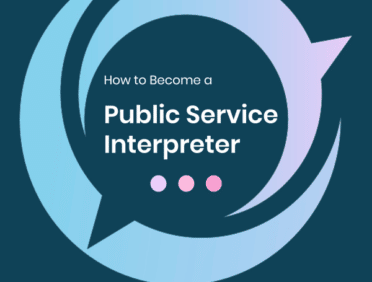Filter by
Working as an Interpreter in the UK
Interpreting is a popular profession for those who speak more than one language in the UK. Interpreting allows those who work in the sector to use their language skills while helping those who really need assistance accessing public services which would otherwise be unavailable to them due to language barriers.
However, to work as an interpreter in the UK it is necessary to become qualified with a minimum of a Level 3 Certificate in Community Interpreting qualification. Learn Q do provide a Level 2, but that is designed for those who wish to do voluntary (i.e. unpaid) interpreting work.
Starting an Interpreting Career
For those new to interpreting, we recommend taking the Level 3 Certificate in Community Interpreting. It teaches you everything you need to know about how to be an interpreter, is the entry level for getting paid interpreting work and is the usual starting point for professional interpreters. If you choose one of our money saving bundles, it includes the course, exam and certificate.
Level 3 Pre-Requisites
To join the Level 3 Certificate in Community Interpreting Course, you do not need to have studied any prior interpreting courses or prove your language abilities prior to joining the course, however, you need to be fluent in speaking English plus one other language to be successful in the final exam.
In terms of Language, for the Level 3 your level should be B2 or above on the Common European Framework for Languages (CEFR): https://www.coe.int/en/web/common-european-framework-reference-languages/
In everyday speech, this level might be called “confident”, as in “I am a confident English speaker”. The official level descriptor is “upper intermediate”. At this level, students can function independently in a variety of academic and professional environments in English, although with a limited range of nuance and precision.
If you are unsure, you can test your English here for free : https://www.efset.org/quick-check/take-test
Level 3 Certificate in Community Interpreting Course Contents
There are two ways to go through the content and all students get access to both:
- The preparation course contains pre-recorded content that can be accessed on our website anytime, worked through in your own time and started immediately.
- You also get invited to weekly, ‘virtual classroom’ live sessions that you will be invited to join along with a cohort of other students, plus these are also recorded so if you choose you can use them to work through at your own pace and at a time of your choosing. There is no set date for the exam so if you wish to take longer or shorter to go through the content you are free to do so.
There isn’t any obligation to attend the live sessions so if you can only make some of them due to your other responsibilities, or you don’t attend any at all, you wont be penalised.
The webinars are:
- Webinar 1: Unit 1: Working as an interpreter in public services
- Webinar 2: Unit 2: Preparing for interpreting assignments
- Webinar 3: Unit 3: Planning to work as a community interpreter in medical settings
- Webinar 4: Unit 4: Planning to work as a community interpreter in the welfare benefits system
- Webinar 5: Unit 5 part 1: Two-way interpreting
- Webinar 6: Unit 5 part 2: Two-way interpreting
- Webinar 7: Unit 6: Performing a sight translation & Unit 7: Continuing Professional Development (CPD) for Interpreters
After the webinars, you will be assigned ‘homework’ assignments. You do not need to complete the homework assignments or get them marked to complete the course. This means that your progress will not be delayed. Of course, the assignments are all relevant to being an interpreter, so we recommend that they are completed so that you absorb the information, and you are best placed to successfully complete the exam.
Level 3 Certificate in Community Interpreting Exam
There are no fixed exam dates. We run exams every working day in the year.
You can book into the exam by completing a booking form when it is convenient to you provided you have completed the payment in full.
- The exam takes place remotely, using videoconferencing software
The exam consists of a role play assessment where you will interpret and provide a sight translation for a Limited English Speaker. You will have to act professionally and not only demonstrate your linguistic skills but also show that you are aware of the industry terminology and requirements. There are two parts:
- Part 1 = consecutive interpreting. you interpret a conversation between a doctor and a patient
- Part 2 = sight translation. you are provided a text in English of around 250 words, you read through it first and then you read it out loud in your other language – like you were reading it for someone who couldn’t read the English version
That’s it – no questions, no essays, no writing. Just the practical – this is one of the reasons why our students complete the qualification much quicker than with other providers.
Level 6 Diploma in Public Service Interpreting (DPSI)
The Level 6 DPSI is known as the gold level in interpreting, and is designed for experienced interpreters. The DPSI has a very low pass rate (less than 30%) even for experienced interpreters so it is not recommended to attempt it without at least 200-400 hours of professional interpreting experience.
The DPSI is an exam is offered by the Chartered Institute of Linguists (CIOL) and costs around £900.
The full DPSI (Units 01-05) can be taken in June. In November they offer the full DPSI (Units 01-05) for the Law pathway only and only written units (Unit 04 and Unit 05) for all other pathways.
- Part 1: two way (consecutive) and simultaneous legal interpreting role play
- Part 2: legal sight translation from English
- Part 3: legal sight translation to English
- Part 4: legal draft written translation from English
- Part 5: legal draft written translation to English
DPSI Pre-Requisites
Level 6 is only suitable for those who already have a Level 3 Certificate in Community Interpreting, 200+ hours’ professional interpreting experience, and your language proficiency in both languages (oral, written and reading) must be C1 or above on the Common European Framework.
In everyday speech, this level might be called “advanced”. At this level, students can function independently and with a great deal of precision on a wide variety of subjects and in almost any setting without any prior preparation.
Level 6 DPSI Course Contents
The Learn Q Level 6 is a self-led DPSI Law preparation course which costs £200 and can be worked through in your own time.
The course includes 100% online access to eleven 2 hour webinar videos, plus activities and assignments which covers the following topics:
- Working as an interpreter in public services
- Preparing for interpreting assignments
- Interpret two way
- Perform a sight translation to and from English
- Interpret simultaneously
- Perform a draft written translation to and from English
- Types of crime and UK laws
- The UK Justice (Courts and Tribunals) system
- Police powers and procedures
- Prison/probation
- Immigration
The online webinars are packed with information about interpreting profession, industry requirements, legislations, glossaries, language providers and more but most importantly provide numerous exercises that will help you practice your interpreting skills. They are designed so that you are completely ready for your exam, and for your life as a professional interpreter.
You also get access to workbooks, past papers and other resources to help you prepare for your exam.
Frequently Asked Questions
The Level 3 Certificate in Community Interpreting is the entry level qualification for paid interpreters and is often a minimum requirement of interpreting clients (such as public services) and interpreting agencies (also known as Language Service Providers) in the UK.
The Level 3 Certificate allows you to accept paid interpreting assignments in community settings including:
- Health
- Mental Health
- Job centres / welfare
- Social services
- Housing
- Education
- Immigration
- Local government
- Charities
Any legal work (e.g. courts, police) usually require a higher level of qualification and at least 2 year’s professional experience
The Essentials bundle includes the course, one attempt at the exam and the certificate. That can be paid in full for £544 or by interest free instalments – instalments start at £68 per month over 8 months: https://learnq.co.uk/courses/interpreting/interpreting-level-3/level-3-certificate-in-community-interpreting-course-and-exam-essentials
There is also a version which has a higher pass rate because it comes with 2 attempts at the exam (the Ultimate bundle) and that costs £600 – instalments start at £75 per month over 8 months: https://learnq.co.uk/courses/interpreting/interpreting-level-3/level-3-certificate-in-community-interpreting-course-and-exam-ultimate
The only difference between these two packages is the number of exam attempts. Essentials has just one attempt at the exam, while Ultimate has two attempts, meaning if you fail the first one you can re-sit for no additional charge. Re-sits are otherwise priced at £150 each.
The course is flexible, so the total time taken is up to you. The average time taken is 3-4 months, but you book the exam when you feel ready.
The course takes place over 7 webinars, with each webinar lasting 2 hours. If you join the live sessions, these take place over 7 weeks (one webinar per week).
If you prefer, you can watch recorded versions of the webinars which are available any time you want them, so that means you can compete the course in your own time. This means you can complete the course much quicker or slower depending on your preference.
After the course, if you want to take the exam it is up to you when you book – you can book immediately or leave it until you have had more chance to revise.
Total hours of learning for successful students are around 70-80 hours.
You can start working through our online content, including recordings of the webinars, as soon as you make your first instalment.
If you want to join our popular Virtual Classroom sessions, we run them all year round, with at least one class starting every month.
The next live classes are scheduled on a specific day of the week 18:00-20:00 and there is one per week, on the same day for 7 weeks. When a class fills up (maximum student numbers are 12) we schedule another one so we have at least one live class starting each month. Please note that places fill up quickly so if you want to start as soon as possible you are best to reserve your place sooner rather than later.
Please contact us directly for the date of the next class.
Yes, it is all studied online so you don’t need to leave your home or spend time travelling to and from a location. The exam is also online via Zoom.
All you need is a good internet connection and an internet ready device (a laptop or PC is best).
You can pay to take a retest which is just £150
It’s cheaper to take the Ultimate bundle option though as it includes 2 attempts at the exam (meaning its just £56 for the additional exam), and if you put the time in studying there is no reason you would fail.
The majority of fails are due to the student underestimating the exam and not studying relevant terminology and vocabulary properly
Unfortunately, as a privately run (non-Government) organisation we do not have any access to direct funding, but you can spread the cost with interest free instalments starting at just £68 per month, plus you can save £25 by using the code subsc1b3
Alternatively, if you claim benefits such as Universal Credit, you might get help from your work coach at the Job Centre. The Job Centre have access to funding through the ‘Low Value Procurement’ scheme, which forms part of the ‘Flexible Support Fund’. It does depend on individual circumstances, but it is definitely worth asking and naming our course. I will send you an email about the course that you can show to them at the end of this chat that might help you to secure funding.
Make sure you mention the ‘Low Value Procurement’ scheme, and the ‘Flexible Support Fund’ specifically. If your work coach doesn’t already know about them that should prompt them to find out.
It’s down to individual Job Centres and Work Coaches whether they provide you funding or not – some students get it, some don’t. I think it often depends on your circumstances including household earnings etc.
Our level 6 is a self-led DPSI Law preparation course which costs £200 and can be worked through in your own time: https://learnq.co.uk/courses/interpreting/interpreting-level-6/level-6-diploma-in-public-service-interpreting-self-led-preparation-course
The exam is offered by the Chartered Institute of Linguists (CIOL) and costs around £900.
The full DPSI (Units 01-05) can be taken in June. In November they offer the full DPSI (Units 01-05) for the Law pathway only and only written units (Unit 04 and Unit 05) for all other pathways.
- Part 1: two way (consecutive) and simultaneous legal interpreting role play
- Part 2: legal sight translation from English
- Part 3: legal sight translation to English
- Part 4: legal draft written translation from English
- Part 5: legal draft written translation to English
The exam needs to be booked directly with CIOL.
Our qualifications are accredited in the UK and approved by Ofqual, the UK government department responsible for maintaining qualification standards. This also means it is accepted by Interpreting Agencies (a.k.a Language Service Providers) and Public Services throughout the UK.
You can read more about our Awarding Organisation and Ofqual on our ‘About’ page here, as well as some links to our courses on the Ofqual Register of Regulated Qualifications: https://learnq.co.uk/about/organisations-qualifications
We do forward successful students names on to eight different interpreting agencies after they pass (Crystal Clear, Clear Voice, The Language Shop, Language is Everything, Clearlingo, DA Languages, Translations Express UK and Silent Sounds)so they may contact you with work opportunities, but it is straightforward enough to join yourself once you have received your certificate. Just Google ‘interpreting agencies’ or ‘Language Service Providers’ though and you will find a lot of them easily. It’s also worth joining interpreter groups on social media as the information shared there tends to be much more current than our information.
We can’t provide a list of all agencies as we don’t work with them all and can’t recommend companies that we don’t work with in case they are bad recommendations, plus it would take a lot of resource to keep it up to date.
Once you have received your certificate, you can use it to register with agencies. We have some videos about it here if you would like to have a look: https://learnq.co.uk/blog/interpreting/the-8-step-guide-to-working-as-an-interpreter
This video will be of particular interest: https://youtu.be/CAuADZdin9g
This qualification is an accredited qualification, which means you get awarded credits for it. The credits do three things:
- They help to define the level of the qualification, and whether it is an Award, Certificate or Diploma. The credits in our course define it as a Level 3 Certificate.
- You can use credits to put toward other qualifications on the same subject, so for instance if you wanted to study another Level 3 in interpreting with someone else you could put the credits you have already earned toward it and not have to re-do things you have already done – sadly you cant put them toward courses in other subjects, or higher levels in the same subject so in terms of interpreting they are pretty limited
- More importantly, some interpreting agencies ask for not only the qualification but also a minimum number of credits – for example, over 12 credits – before they will work with an interpreter. Our qualification has the highest number of credits available for courses of its kind, so this will not present you with any issues whereas some of the courses offered by our competitors do not have enough credits to work with everyone.
In terms of Language, for the Level 3 your level should be B2 or above on the Common European Framework for Languages (CEFR): https://www.coe.int/en/web/common-european-framework-reference-languages/
In everyday speech, this level might be called “confident”, as in “I am a confident English speaker”. The official level descriptor is “upper intermediate”. At this level, students can function independently in a variety of academic and professional environments in English, although with a limited range of nuance and precision.
If you are unsure, you can test your English here for free : https://www.efset.org/quick-check/take-test
At level 3 you can use the same certificate for more than one language, regardless of the language you take the exam in. This means we normally recommend students to take the exam in their strongest language combination.
Interpreting agencies may ask for additional proof of your language abilities in addition to your interpreting qualifications
At Level 6 DPSI, you will need a separate qualification for each language.
No. Levels 1 and 2 are aimed at voluntary (unpaid) interpreters.
You do not need to have completed any of the lower levels to take level 3 as all of the content from Levels 1 and 2 are covered at Level 3.












